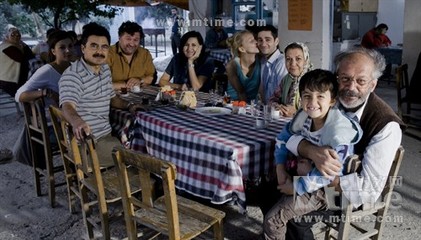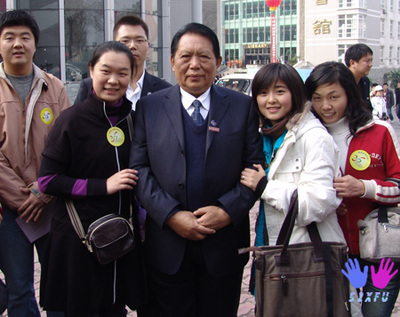刘峥嵘,1990年赴德,2004年成为朗盛公司人力资源主管,根据百度的说法,为欧洲企业职位最高的中国人。10月31日《法兰克福汇报》以“融合——一个中国人”为题,长篇报道刘峥嵘在德20年的成功经历。
这篇倒不是写给那些正摩拳擦掌,整天琢磨怎么才能成功的年轻人看的武林秘籍。而是要给没能“成功”融入德国社会的外国人树立一个榜样,看看别人怎么打入德国主流社会。说白了也没其他什么国家,就是针对在德国的土耳其人。
土人这么碍眼,主要原因有二。其一,土人不爱讲德语;其二,人数众多。对于土人来说,没什么不方便,他们生活的挺好,吃穿住用行不受任何影响。但是纯正德国人看不过去了,那么多外国人,聚在一起,圈出一个个城中之城,长此以往,不就国将不国了么?
当初缺劳工才让人家来的,这会儿总不能过河拆桥,那要怎么办呢?德国人找到一个关键——学德语。只有讲德语才能走出土人区,迈出融入德国社会的第一步。仔细看刘峥嵘这篇报道,写他如何从刚到德国完全不懂德语,到取得文科硕士,又在化工企业中谋得职位。学习历程不重要,公司里怎么运作也不重要,关键在于最终他能够用标准德语和那些德国员工沟通。用语,口音和词汇量都不输人。仿佛不经意的带过,却无不在暗示土人们:“学德语吧,学德语有光明的前途!”
除了语言,移民二代的身份认同也影响着社会融合的程度。文章提到,刘峥嵘让自己的孩子学了德语和汉语,但是孩子们在德国长大,似乎更愿意讲德语。至于孩子们如果将来愿意做德国人怎么办?这个中国籍的父亲说了,要尊重他们的选择。这样理性开明的做法,值得土人家长效仿。
当然德国社会也是值得融入的。刘峥嵘的生活轨道印证了这点,只要你肯融入德国社会,你也能从中获得更好的发展,拥有更美好的生活。
不知道德国土人能不能感受到《汇报》记者的用心良苦,还是根本不会像我这样翻看有关刘峥嵘的报道?但是我确实有点感动。一来看到刘峥嵘的奋斗事迹多少受到些鼓舞。同为中国人,看到同胞在外乡成功,还是不能免俗的小小激动了一下。二来则纯粹是为了《汇报》这委婉的规劝。
德国人民嫌恶土人是不假的。但他们首先没有过河拆桥,用国籍户口把土人都赶回老家去。其次,他们不仅没有过河拆桥,还如此耐心的规劝引导。回想到我在北京曾见过的那些农民工子弟,《汇报》记者所体现出来的德国人民在这件事情上的耐心和宽容,让我感动。
2010-11-03
德国的移民问题一般来说,在德国说土耳其移民问题是政治不正确的,就像是在中国反对土共一样。
这哥们是把大家不敢说的话说了,写了本书《德国越来越不像【我们】的德国》,把这事给挑了,惹了一堆骂,不过实际上大多数德国的精英是嘴上骂,心里急。
an immigration row in germany: sarrazin vs the saracens | the economist - stumbleupon sarrazin vs the saracens
sep 1st 2010, 21:08 by the economist | berlin
it was an unusual book launch. journalists jammed themselves into a suite of overcrowded rooms at the headquarters of berlin’s press corps. security was tighter than for appearances by the chancellor. when the author at last showed up he was greeted with the flashbulb fireworks you expect on the red carpet at the kodak theatre. the centre of the fuss was thilo sarrazin, a rather dour economist who sits on the board of the bundesbank. his book, "deutschland schafft sich ab” (“germany does away with itself”) is explosive.
in a nutshell, mr sarrazin’s argument is that the right sort of german women are having too few babies and that the wrong sort—muslims and those with little education—are having too many. the result is not only that germany’s population is shrinking, it is also getting dumber. “with higher relative fertility among the less intelligent, the average intelligence of the population declines,” he writes. his defence of eugenics—through policies to encourage fertility among smart women—seems like a throwback to a grimmer time.
for this mr sarrazin has been roundly and nearly unanimously denounced by the political establishment. the social democratic party (spd), to which he surprisingly belongs, has started proceedings to expel him. angela merkel, the chancellor, accused him of “dividing society.” the bundesbank is wrestling with the question of whether to sack him, which might require the approval of the german president.
but among a lot of ordinary germans mr sarrazin has struck a chord. the publisher cannot ship the book to shops fast enough—many are sold out. in one survey conducted by a television news station, 95% of the respondents did not think his statements went too far. unlike many of its neighbours germany does not have strong right-wing parties led by populist rabble-rousers. mr sarrazin looks to many like germany’s leading candidate to fill the gap. comparisons with geert wilders, the flamboyant anti-islamic leader of the dutch party for freedom, are common.
this does not seem right. the dry, understated mr sarrazin can fill a conference room but probably not a concert hall. although the spd wants to be rid of him, he means to keep his membership “to the grave” if he can. the issues he discusses should be addressed by the big political parties, he thinks, not left to radical right-wing forces, which he regards as “very dangerous”.
much of what he says has been said before by perfectly respectable people. mr sarrazin is not the first to notice that the children of immigrants from turkey lag behind those from vietnam or greece in education and employment (italians also seem to underperform). nor is he the first to point out that germany’s relatively generous welfare system saps the initiative of badly educated migrants. ministers routinely bemoan the growth of “parallel societies” among muslim immigrants and their children. the government encourages middle-class women to bear children by offering a parental leave stipend linked to the parents’ salaries, the sort of family policy mr sarrazin would like to see more of.
where he runs into trouble is with two theses that are normally found on the fringes of polite society. the first is his sweeping condemnation of islam, which could easily be echoed by mr wilders or his compatriot, somali-born ayaan hirsi ali. mr sarrazin rehearses the usual accusations of intolerance, illiberalism and penchant for violence and concludes that “at bottom, islam today has a fraught relationship with western modernity.”
the second is his claim that, because people at the bottom of the social pyramid are less intelligent and have more children than those at the top, and because intelligence is largely inherited, “the inherited intellectual potential of the population is being progressively diluted.” mr sarrazin compounded the damage by referring carelessly in an interview to a “certain gene” shared by “all jews”. this appeared to bring him perilously close to the pseudo-scientific ranking of ethnic groups that the nazis engaged in.
but the accusations of racism and anti-semitism seem overdone. it is fairly clear that he likes jews, who are not known as underachievers and do appear to be biologically linked to one another, although not in the crude way mr sarrazin at first suggested. he does not propound the preposterous idea that muslims are genetically inferior to non-muslims; his objections to the religion are cultural and political. at one point he graciously suggests that germany could use well-educated workers from turkey and egypt. mr sarrazin’s sin is to condemn on different grounds two large groups—muslims and the lower class—whose integration into german society is vital for its future and who are not, in fact, doomed from birth.
in a way, the stir he has created is a tribute to germany’s political culture. the mainstream parties are not blind to the problems he identifies but strive to be politically correct about them. the few openly xenophobic parties are marginalised. mr sarrazin has given voice to fears and resentments that have no political outlets. germany has rightly worked hard to close them off. now that mr sarrazin has prised one open, politicians will have to work doubly hard to prove him wrong.
2010-11-03
我:
这二个人的对话好玩。一个是从远到近,一个是点破了德国人心里的纠结。德国人希望用榜样的力量来教化土人归化,魏玛共和国时期对犹太人也用过这一招,似乎在相当长时间里效果显著。可惜好景不长,俄罗斯犹太人的革命运动激发了德国犹太精英的主人翁意识,信心爆棚。犹太精英期望在德国也可以通过和平演变从买卖人,知识分子上升为管理国家的领导阶层,结果怎么样?大家都知道。德国人希望通过一个中国工蚁模范来引导土人忘记自己,但同时也在告诫他们,你们这些土人永远也不许变成和我们一样。中国榜样是德国土人的最高界限,也就是可以把你们评为农民工代表的全国劳模。如果你是德国土人,你该怎么办?下一个诺贝尔文学奖会来自德国土人,现实纠结,在魔幻中抒发情怀。我不愿意回到土耳其,但我立志在虚构中把德国幻化为土耳其。

2010-11-05
这一句好:“我不愿意回到土耳其,但我立志在虚构中把德国幻化为土耳其。”——纠结与试图超越纠结。
 爱华网
爱华网



